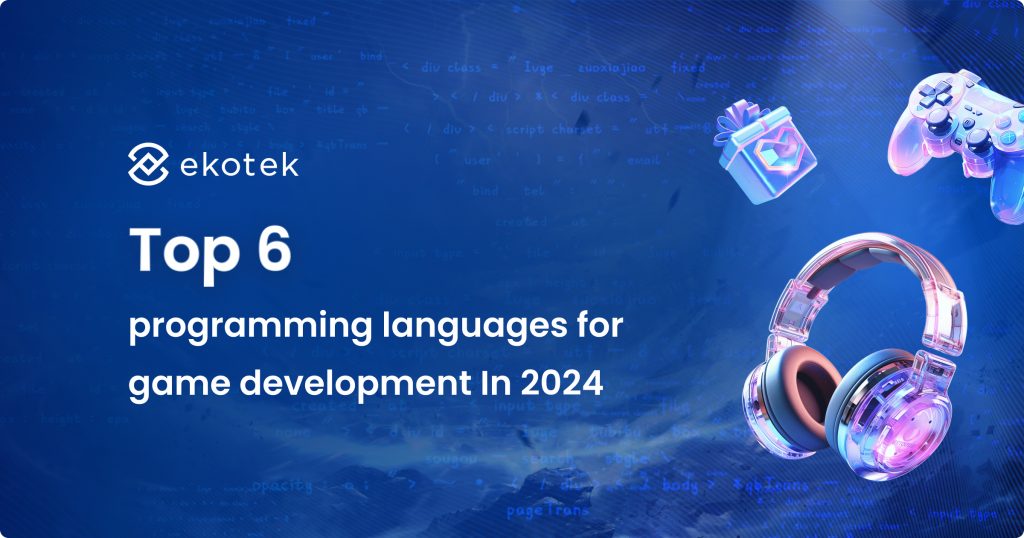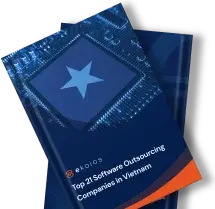Following the global impact of the COVID-19 pandemic, the gaming industry has experienced a substantial surge in success, resulting in a notable increase in demand for game-related jobs and game development. Whether you are an aspiring game developer or the owner of a game studio, it is essential to be aware of which is best programming language for game development. Let us delve into this further!
6 best languages for game development

C++
C++ is a powerful, versatile, and widely used programming language that has long been a staple in the game development industry. The language has low-level access to system resources, performance optimization capabilities, and support for object-oriented programming, making it an excellent choice for creating high-performance, resource-intensive games. Developers can have fine-grained control over system resources and memory management.
Key features:
- Performance: A compiled language, it translates directly into machine code, making it extremely fast and efficient
- Compatibility with Game Engines: Highly compatible with several major game engines, like Unreal Engine, CryEngine
- Extensive libraries and frameworks: A vast ecosystem of libraries and frameworks that simplify many aspects of game development
C#
C# is a versatile and modern programming language developed by Microsoft, known for its robustness and ease of use. It has a comprehensive standard library that simplifies many programming tasks, from file handling to networking. It offers a clean and intuitive syntax, excellent tooling support, and seamless integration with the .NET framework, enhancing development productivity. C# can be used to develop games for various platforms, including PC, consoles, mobile devices, and web browsers.
Key features:
- Integration with .NET framework: Provides access to a wide range of tools and libraries within the .NET ecosystem, enhancing development productivity
- Versatility: Uses to develop games for various platforms, including PC, consoles, mobile devices, and web browsers
Java
Java is an object-oriented language, which helps in organizing code into reusable components, making it easier to manage complex game projects. One of Java’s biggest advantages is its platform independence, which allows games developed in Java to run on any device with a JVM. A game can be developed once and deployed on multiple platforms, including Windows, macOS, Linux, and mobile devices.
Key features:
- Platform independence: Java applications are compiled into bytecode, which runs on any device equipped with the Java Virtual Machine (JVM)
- Security: Provides a secure environment by managing memory access and providing built-in security features
- Automatic memory management: Helps prevent memory leaks and other memory-related issues
💡 Read more about how Ekotek help elevate player experience of Bunicorn game to the next level
JavaScript
JavaScript is essential for web-based game development. Its integration with HTML5 makes it a powerful tool for creating interactive games that run in browsers. Numerous libraries and frameworks are available for JavaScript game development, such as Phaser, Three.js, and Babylon.js, which provide powerful tools for creating both 2D and 3D games.
While JavaScript may not be the first choice for high-performance AAA games, it is well-suited for casual games, educational games, and social games that can run directly in a web browser.
Key features:
- Integration with HTML5 and CSS3: Enable developers to create rich, interactive web games with ease
- Event-driven programming: Excel in handling events, making it ideal for interactive games that rely on user input and real-time updates.
Python
Python is celebrated for its simplicity and readability, making it an excellent choice for beginners. The language is widely used in AI and machine learning. Developers can integrate these technologies into games to create smarter NPCs and more dynamic game environments. With Python, developers can quickly bring their game ideas to life, leveraging its rich ecosystem of libraries and frameworks.
Key features:
- High-level language: Abstracts many of the complex details of the machine, making it easier to write code quickly and efficiently
- Beginner-friendly: This ease of learning translates well into game development, allowing new developers to start creating games more quickly.
Lua
Lua is a lightweight, high-level, multi-paradigm programming language designed primarily for embedded use in applications. It can be easily integrated with other programming languages, making it highly extensible and allowing developers to add functionality as needed. For developers looking for a scripting language that balances ease of use with powerful capabilities, Lua offers an attractive option.
Key features:
- Lightweight: Lua is designed to be lightweight, both in terms of memory usage and execution speed
- Embeddable: Lua is often embedded into other applications as a scripting language. It can be used to control the behavior of game engines and other software systems.
How to Choose the Best Game language for game development
Selecting the best programming language for game development depends on various factors since each language possesses unique strengths and competes closely with others. Here are some key considerations to keep in mind when choosing the right programming language for your game project:
🔹 Game complexity and performance requirements
For resource-intensive, high-performance games, lower-level languages like C++ and C# may be the best choice. For simpler, web-based, or mobile games, higher-level languages like JavaScript and Python may be more suitable.
🔹 Target platforms and cross-platform compatibility
Consider the platforms your game will be deployed on, such as PC, console, mobile, or web, and choose a language that aligns with the platform’s native tools and ecosystem.
🔹 Development team expertise
Select a language that your development team is already familiar with or is willing to learn, as this can significantly impact the project’s timeline and overall success
🔹 Game engine and framework integration
Certain game engines, such as Unity and Unreal Engine, have specific language requirements. Aligning your language choice with the engine you plan to use can streamline the development process and provide access to a wealth of pre-built tools and resources.
🔹 Rapid prototyping and iteration
If you need to quickly build and iterate on game concepts, languages that support rapid development, such as Python or JavaScript, are the most suitable choices.
📌 Check out 5 factors to consider for building web3 gaming

Key considerations when starting to develop a game
Starting a game development project involves several critical considerations:
🔹 Define the game concept and target audience: Establish a clear vision for your game, its genre, gameplay mechanics, and the target audience. This will help guide your design and development decisions.
🔹 Assemble a skilled development team: Ensure that your team includes professionals with expertise in areas such as programming, art, design, audio, and project management.
🔹 Choose the right game engine and development tools: Select a game engine (e.g., Unity, Unreal Engine, Godot) that aligns with your project’s requirements and the team’s familiarity. Invest in reliable development tools and leverage industry-standard software to streamline the production process.
🔹 Implement a robust project management strategy: Establish a clear development roadmap, milestones, and communication protocols to ensure efficient collaboration and timely delivery.
🔹 Incorporate emerging technologies and trends: Stay informed about the latest advancements in the gaming industry, such as blockchain, AI, AR/VR, and explore ways to integrate these technologies to enhance the player experience.
📌 Free download: Best tactics to build a sustainable Web3 game ecosystem
If your in-house team lacks this expertise or the cost of hiring such a team is prohibitive, you may wish to consider outsourcing to a vendor who can assist in integrating these emerging technologies. Let me introduce Ekotek, game development firm in Vietnam, offering comprehensive services to help you bring your game vision to life. Contact us to discover how we can revolutionize your games with innovative solutions.

Conclusion
Choosing the right programming language for game development is crucial to creating successful and engaging games. Each language has its strengths and weaknesses, and the best choice depends on your specific needs and goals. By understanding the features of each language, you can make an informed decision and set your project up for success.
Whether you are just starting or looking to take your game to the next level, Ekotek is here to support you with our expert game development services. Contact us today to learn more about how we can help you achieve your game development goals.


